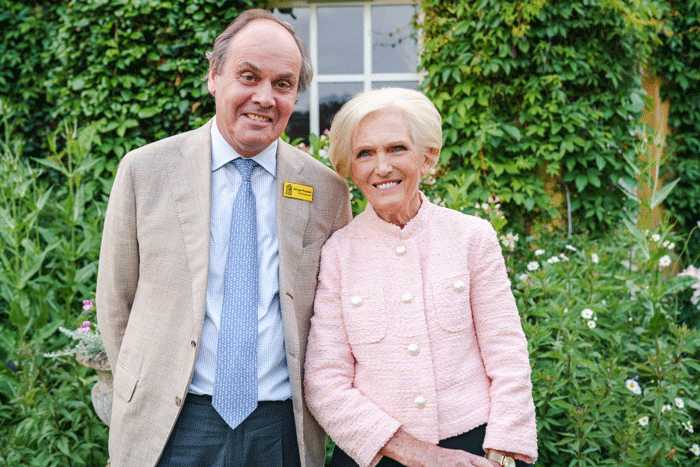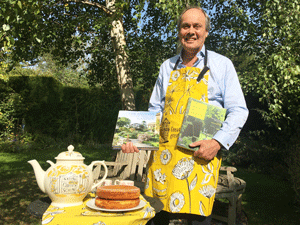A decade at the helm of the NGS
 November 2020 sees National Garden Scheme (NGS) Chief Executive, George Plumptre, (pictured above) celebrate 10 years at the helm of this much-loved garden charity. In this feature, George talks about the past decade, the challenges of the coronavirus and the health benefits of gardening.
November 2020 sees National Garden Scheme (NGS) Chief Executive, George Plumptre, (pictured above) celebrate 10 years at the helm of this much-loved garden charity. In this feature, George talks about the past decade, the challenges of the coronavirus and the health benefits of gardening.
George Plumptre’s 40-year career in gardens has included being author of numerous books, extensive work as a journalist (he was gardening correspondent of The Times between (1993-96) and founder of the gardening internet start-up Greenfingers.com. He became Chief Executive Officer (CEO) of the National Garden Scheme in 2010. His book, The English Country House Garden (2014) won the Garden Media Guild award for ‘Inspirational Book of the Year’ and he is noted for his acclaimed biography of Edward VII. Today, he writes for The Telegraph and Country Life.
George points out that the landscape has changed dramatically in terms of gardens, gardening and garden visiting since he joined the NGS a decade ago and that while the British have remained a nation of gardeners and garden lovers, the events of 2020, both in terms of the coronavirus pandemic and concerns for the environment, have given new importance to the role of gardens and garden visits that provides the NGS with a strong spring board for future development and campaigns: “Never, since the NGS was founded in 1927, had our gardens been forced to shut. They even remained open during the Second World War, so to say that the impact of the coronavirus pandemic was enormous is no understatement,” he adds.
The restrictions imposed in 2020 forced the closure of over 3,700 largely privately-owned gardens that had planned to open for the charity at a time when the beneficiaries they help fund across the nursing and health sector needed the funding most.
 For the first time in its history the NGS had to reduce the amount promised to its beneficiary charities at the beginning of the year: “Since 2010 income from our gardens has increased from £3 million to £4 million despite the numbers of gardens opening remaining fairly constant at between 3,500 and 3,700,” explains George. “This has given us an increase in the net funds available for distribution to our beneficiaries from £2.5 million to £3.3 million.” Despite having to reduce the amount promised this year, fortunately in November, after a hugely challenging period, the NGS will announce additional donations. The Great British Garden Party, organised by the NGS, in September, was highly successful and brought in almost £40,000 for the Help Support Our Nurses campaign. From NGS President Mary Berry to garden owners, visitors, friends and family, small events took place up and down the country.
For the first time in its history the NGS had to reduce the amount promised to its beneficiary charities at the beginning of the year: “Since 2010 income from our gardens has increased from £3 million to £4 million despite the numbers of gardens opening remaining fairly constant at between 3,500 and 3,700,” explains George. “This has given us an increase in the net funds available for distribution to our beneficiaries from £2.5 million to £3.3 million.” Despite having to reduce the amount promised this year, fortunately in November, after a hugely challenging period, the NGS will announce additional donations. The Great British Garden Party, organised by the NGS, in September, was highly successful and brought in almost £40,000 for the Help Support Our Nurses campaign. From NGS President Mary Berry to garden owners, visitors, friends and family, small events took place up and down the country.
For the charity, the core activity is opening gardens to visitors, with the challenge always to hold onto the heritage built up over more than 90 years while at the same time moving with the times and making appropriate changes.
 (above: George with NGS President, Dame Mary Berry)
(above: George with NGS President, Dame Mary Berry)
At the helm, George has worked hard on many fronts to make the organisation more engaged and accessible and these were key priorities in the rebranding of the NGS in 2017 to mark its 90th anniversary. George now believes that the charity is more actively engaged with key stakeholders, volunteers and garden owners, with a growing audience of committed supporters.
The charity has also developed active partnerships with beneficiary charities enabling the NGS to work with them to form the basis of a variety of joint activities. These new partnerships have played a key role in what George considers perhaps the most significant development he has brought to the NGS – the championing of the benefits of gardens to everyone’s health and wellbeing. This was formally launched in 2016 with the publication of a report commissioned by the National Garden Scheme from the prestigious health think tank, The King’s Fund, entitled ‘Gardens and Health: implications for policy and practice‘.
“The report has become the acknowledged point of reference for the subject and enabled us to launch a range of initiatives which have grown ever since,” points out George. “On the one hand we launched a new Gardens and Health strand of our donations policy, awarding annual donations to charities to build gardens to provide health and wellbeing benefits, such as Horatio’s Gardens for spinal injury units. On the other, our community of garden owners have increasingly embraced the concept of gardens being good for everyone’s health, both for themselves and as a cornerstone of their welcome to visitors.”
Gardens and health have also influenced their focus on developing the diversity of its gardens and they have consciously moved to encouraged a range of gardens to open, a number of which clearly offer health and wellbeing benefits to people such as hospice and community gardens. Added to which, the NGS is focusing on gardens and health as a means of influencing both public attitudes and policy making: “I believe that our group of beneficiary charities and the long-term nature of our support for them, puts us in a unique position to champion the extraordinary contribution they make to the nation’s health, especially community health,” points out George. “In 2019 The King’s Fund published a second report we commissioned, Investing in Quality: the contribution of large charities to shaping future health and care and in 2020 we commissioned a further report, Changing Lives: charities supported by the National Garden Scheme that will be published in November.”
 There is no doubt that he did not expect his 10th anniversary to be marked by the magnitude of coronavirus with its obviously immense challenges nor that for the first time in the history of the NGS, gardens would be forced to close and not reopen for several months. He points out, however, that like most charities, the NGS quickly demonstrated extraordinary qualities of tenacity and adaptability: “Unable to welcome visitors physically to their gardens, our owners made short videos which we posted online on a weekly basis. By the time the gardens reopened we had built up a library of 182 films which have been viewed 650,000 times and produced donations of some £250.000.”
There is no doubt that he did not expect his 10th anniversary to be marked by the magnitude of coronavirus with its obviously immense challenges nor that for the first time in the history of the NGS, gardens would be forced to close and not reopen for several months. He points out, however, that like most charities, the NGS quickly demonstrated extraordinary qualities of tenacity and adaptability: “Unable to welcome visitors physically to their gardens, our owners made short videos which we posted online on a weekly basis. By the time the gardens reopened we had built up a library of 182 films which have been viewed 650,000 times and produced donations of some £250.000.”
He realises the real sadness and hardship that the coronavirus has brought for many in the scheme and their beneficiaries but the response has made him enormously proud and demonstrated the ability of everyone to change: “One major outcome of the pandemic which I am certain will last and which the National Garden Scheme is uniquely positioned to nurture and champion, has been the huge public acknowledgement of the importance of people having access to gardens or outdoor green space. Faced with uncertainty, isolation and in many cases real tragedy, people discovered the extraordinary rewards offered either by their own gardens or by having access to somewhere, whether a public green space, or a shared community area.”
As the NGS heads towards its 100th birthday in 2027, CEO George Plumptre is confident that the charity will reach that momentous anniversary in fine health, raising and donating more money for its beneficiaries and thoroughly in tune with the times: “Accessibility was a fundamental priority at the time of our foundation in 1927: the principle that for a modest donation to charity of one shilling anyone, whatever their status in society, could have access to a range of private gardens, launched a cherished ideal which has remained with the charity ever since and which is core to its individuality. Today, we are positioned to champion the importance of gardens to society as a whole, at the same time as continuing to grow the virtuous circle of offering people the enjoyment of a garden visit to raise funds for our beneficiaries who are so fundamental to the health of the nation,” he says.
 Among the Charity’s beneficiaries are the Queen’s Nursing Institute, Macmillan Cancer Support, Marie Curie, Parkinson’s Hospice UK, Hortio’s Gardens and Carers Trust. Since its foundation the NGS has given more than £60 million to its nursing beneficiaries.
Among the Charity’s beneficiaries are the Queen’s Nursing Institute, Macmillan Cancer Support, Marie Curie, Parkinson’s Hospice UK, Hortio’s Gardens and Carers Trust. Since its foundation the NGS has given more than £60 million to its nursing beneficiaries.
You can find out more about the work of the National Garden Scheme, participating gardens and where you can pre-order the Garden Visitor’s Handbook 2021 at: https://ngs.org.uk/

